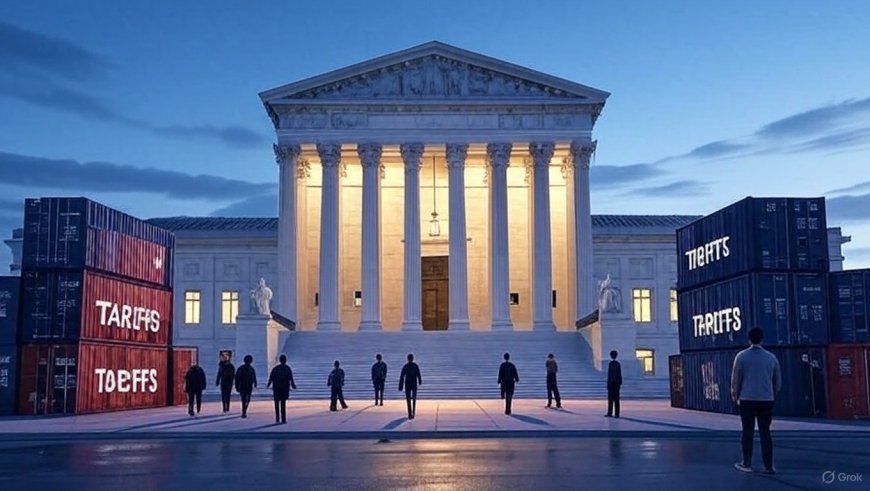Court Rulings Threaten Trump-Era Tariffs: Refunds May Be on the Horizon
A federal appeals court has ruled against Trump-era tariffs, opening the door to billions in potential refunds for U.S. importers. Legal experts expect a Supreme Court battle.

A series of recent appellate court rulings has thrown the Trump administration’s signature trade tariffs into legal jeopardy, raising the possibility that billions of dollars in duties collected from importers may have to be refunded.
The decisions mark one of the most significant judicial challenges to former President Donald Trump’s economic agenda, which had relied heavily on tariffs against China, the European Union, and other trading partners.
The Appellate Court’s Findings
The U.S. Court of Appeals for the Federal Circuit, in a ruling issued Wednesday, found procedural flaws in the way the administration imposed certain tariffs in 2018 and 2019. The court determined that the executive branch overstepped its statutory authority under Section 232 of the Trade Expansion Act and failed to adequately justify the national security rationale for extending tariffs beyond their original scope.
According to Reuters, the decision specifically questioned the expansion of tariffs on steel and aluminum products that had initially targeted only a narrow set of imports. The court argued that the Commerce Department’s justification “lacked sufficient evidence and failed to follow the legally required review process.”
Billions at Stake
If the ruling is upheld, importers who have challenged the duties could seek refunds stretching back several years. Analysts estimate that more than $80 billion in tariffs were collected during Trump’s presidency, much of it passed down to consumers in the form of higher prices.
“Refund claims could create a substantial fiscal liability for the federal government,” said trade attorney Michael Donovan. “This is uncharted territory — we have never seen this scale of potential tariff refunds in U.S. history.”
The U.S. Department of Justice is expected to appeal the ruling to the Supreme Court, setting up a high-stakes legal showdown.
Political and Economic Fallout
The decision comes at a politically sensitive moment. President Trump, who returned to the White House in January 2025, has defended tariffs as a “necessary tool to protect American workers.” He has warned that removing or refunding the duties would “reward foreign cheaters at the expense of U.S. manufacturing.”
Yet business groups, including the U.S. Chamber of Commerce, argue that tariffs created long-term costs and disrupted global supply chains. A recent report by The Wall Street Journal noted that several industries — from automotive manufacturing to construction — faced rising input costs that contributed to inflationary pressures.
Importers Push for Refunds
Hundreds of importers have already filed legal petitions seeking refunds, and the appellate court’s ruling has emboldened others to follow suit. Law firms representing affected companies expect a surge in claims, particularly from sectors like construction, electronics, and consumer goods.
“Companies have been waiting years for relief,” said Donovan. “Now, with this ruling, they have real legal leverage.”
What Happens Next
The federal government faces a narrow window to seek a stay of the appellate ruling. If the Supreme Court declines to hear the case or upholds the lower court’s findings, Treasury officials could be forced to begin processing refunds.
Observers warn that such a move would have profound budgetary implications. “Refunding even a fraction of the collected tariffs could blow a hole in federal revenues,” said University of Michigan economist Laura Bennett.
Meanwhile, trade experts caution that the uncertainty could further rattle global markets already grappling with instability in Asia and Europe.
A Defining Legal Test
At its core, the appellate ruling represents a test of presidential power in trade policy — a domain where Congress has historically granted broad discretion to the executive branch.
“This is about the limits of presidential authority,” said Bennett. “For decades, presidents have stretched the definition of ‘national security’ to justify tariffs. The courts are now saying there are limits.”
As the legal battle heads toward what could be a Supreme Court showdown, businesses, consumers, and policymakers alike are bracing for a verdict that may reshape U.S. trade policy for years to come.
What's Your Reaction?
 Like
0
Like
0
 Dislike
0
Dislike
0
 Love
0
Love
0
 Funny
0
Funny
0
 Angry
0
Angry
0
 Sad
0
Sad
0
 Wow
0
Wow
0







































































